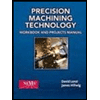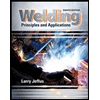
Automotive Technology: Principles, Diagnosis, And Service (6th Edition) (halderman Automotive Series)
6th Edition
ISBN: 9780135257272
Author: James D. Halderman
Publisher: PEARSON
expand_more
expand_more
format_list_bulleted
Concept explainers
Textbook Question
Chapter 14, Problem 9CQ
Which is the smallest?
- a. 1/16
- b. .25
- c. 3/8
- d. .33
Expert Solution & Answer
Want to see the full answer?
Check out a sample textbook solution
Students have asked these similar questions
2: A rectangular aluminum block is loaded uniformly in three directions. The loadings are as follows:a 50 kN total resulting compressive load in the x-direction, a 200 kPa uniformly distributed tensile load in they-direction, and a 0.03 MN total resulting tensile load in the z-direction. The block has the following dimensions:L = 1 m, b = 20 cm, h = 350 mm. Use E = 70 GPa and ν = 0.25.Determine the strain in the x and y axes respectively. For the strain in the y-direction to be equal to 0, how much uniformly distributed load inthe surface of y-direction should be added? (+ for tensile, - for compressive)
Answers:
5 -1.122 x10-5 / 3 decimals
6 5.102 x10-6 / 3 decimals
7 -0.357 MPa / 3 decimals
A spherical balloon with a diameter of 9 m is filled with water vapour at 200˚C and 200 kPa. Determine the mass of water in the balloon. The R value for water is 0.4615 kJ/kg∙K.
Correct answers are written below. Detailed and correct solution only with fbd. I will upvote.
1: A 3 m alloy shaft fixed at one end has a torsional shearing stress capacity of 55 MPa. Due to improper fabrication, its cross-sectionalarea has become irregularly shaped. Its effective polar moment of inertia has become 2 x10-7 m4, and the maximum torque stress acts at 7.5 cm fromthe center of the shaft.[1]: If the shaft is to be replaced by a properly manufactured solid circular shaft that has a maximumshearing stress capacity of 70 MN/m2, what is the minimum diameter required so it can withstand the sameload? [2]: Calculate the thickness of a hollow circular shaft with the same outside diameter calculated initem [1] that can carry the same load. Limit the maximum shearing stress of the hollow circular shaft to0.09 GPa.Determine the angle of twist on the free end of the shaft. Use G = 150 x103 GPa. [3]: Use the solidcircular shaft from [1] and use the hollow circular shaft from [2].…
Chapter 14 Solutions
Automotive Technology: Principles, Diagnosis, And Service (6th Edition) (halderman Automotive Series)
Ch. 14 - What is the formula for determining fuel economy?Ch. 14 - Why are the torque and horsepower of an engine...Ch. 14 - What service operation may require the technician...Ch. 14 - What service operation may require the technician...Ch. 14 - What math function is needed to calculate the...Ch. 14 - Prob. 1CQCh. 14 - Which of the following shows the relationship of...Ch. 14 - Prob. 3CQCh. 14 - Prob. 4CQCh. 14 - Prob. 5CQ
Knowledge Booster
Learn more about
Need a deep-dive on the concept behind this application? Look no further. Learn more about this topic, mechanical-engineering and related others by exploring similar questions and additional content below.Similar questions
- two closed 1 m3 chambers are filled with fluid at 25˚C and 1 atm. One is filled with pure carbon dioxide and one is filled with pure water. Only considering the weight of the fluids, which chamber is heavier?arrow_forwardCorrect answers are written below. Detailed and correct solution only with fbd. I will upvote. 1: A 3 m alloy shaft fixed at one end has a torsional shearing stress capacity of 55 MPa. Due to improper fabrication, its cross-sectionalarea has become irregularly shaped. Its effective polar moment of inertia has become 2 x10-7 m4, and the maximum torque stress acts at 7.5 cm fromthe center of the shaft.[1]: If the shaft is to be replaced by a properly manufactured solid circular shaft that has a maximumshearing stress capacity of 70 MN/m2, what is the minimum diameter required so it can withstand the sameload? [2]: Calculate the thickness of a hollow circular shaft with the same outside diameter calculated initem [1] that can carry the same load. Limit the maximum shearing stress of the hollow circular shaft to0.09 GPa.Determine the angle of twist on the free end of the shaft. Use G = 150 x103 GPa. [3]: Use the solidcircular shaft from [1] and use the hollow circular shaft from [2].…arrow_forwardPlease can you assist me with the attached question. Many thanks.arrow_forward
- Please can you assist me with the attached question. Many thanks.arrow_forwardPlease can you assist me with the attached question. Many thanks.arrow_forwardIn using the bolt cutter shown, a worker applies two forces P to the handles. If the magnitude ofP is 500 N, determine the magnitude of the forces exerted by the cutter on the boltarrow_forward
- Arterioles bifurcate (i.e., split) into capillaries in the circulatory system. Blood flows at a velocity of 20 cm/s through an arteriole with a diameter of 0.20 cm. This vessel bifurcates into two vessels: one with a diameter of 0.17 cm and a blood flow velocity of 18 cm/sec, and one with a diameter of 0.15 cm. Each of these two vessels splits again. The 0.17-cm diameter vessel splits into two vessels, each with a diameter of 0.15 cm. The 0.15-cm diameter vessel splits into two vessels, each with a diameter of 0.12 cm. Determine the mass flow rate and velocity of blood in each of the four vessels at the end of the arteriole bifurcations. You may need to set up several systems, each with a different system boundary, in order to solve this problem.arrow_forward6) Draw a Front, side and Top view for the following objects: p.s. you don't need to label the alphabet ISOMETRIC PICTORIAL VIEW K R C B E R D 0 Aarrow_forwardPlease draw the front top and side view for the following objectarrow_forward
- Draw the top viewarrow_forwardSuppose that a steel of eutectoid composition is cooled to 675°C (1250°F) from 760°C (1400°F) in less than 0.5 s and held at this temperature. (a) How long will it take for the austenite-topearlite reaction to go to 50% completion? To 100% completion? (b) Estimate the hardness of the alloy that has completely transformed to pearlite.arrow_forwardProblem 2: Determine the components of the reaction at point B (Please use paper sheet + FBD ,don't use chatgpt) MECHANICAL ENGGarrow_forward
arrow_back_ios
SEE MORE QUESTIONS
arrow_forward_ios
Recommended textbooks for you
 Precision Machining Technology (MindTap Course Li...Mechanical EngineeringISBN:9781285444543Author:Peter J. Hoffman, Eric S. Hopewell, Brian JanesPublisher:Cengage Learning
Precision Machining Technology (MindTap Course Li...Mechanical EngineeringISBN:9781285444543Author:Peter J. Hoffman, Eric S. Hopewell, Brian JanesPublisher:Cengage Learning International Edition---engineering Mechanics: St...Mechanical EngineeringISBN:9781305501607Author:Andrew Pytel And Jaan KiusalaasPublisher:CENGAGE L
International Edition---engineering Mechanics: St...Mechanical EngineeringISBN:9781305501607Author:Andrew Pytel And Jaan KiusalaasPublisher:CENGAGE L Welding: Principles and Applications (MindTap Cou...Mechanical EngineeringISBN:9781305494695Author:Larry JeffusPublisher:Cengage Learning
Welding: Principles and Applications (MindTap Cou...Mechanical EngineeringISBN:9781305494695Author:Larry JeffusPublisher:Cengage Learning

Precision Machining Technology (MindTap Course Li...
Mechanical Engineering
ISBN:9781285444543
Author:Peter J. Hoffman, Eric S. Hopewell, Brian Janes
Publisher:Cengage Learning

International Edition---engineering Mechanics: St...
Mechanical Engineering
ISBN:9781305501607
Author:Andrew Pytel And Jaan Kiusalaas
Publisher:CENGAGE L

Welding: Principles and Applications (MindTap Cou...
Mechanical Engineering
ISBN:9781305494695
Author:Larry Jeffus
Publisher:Cengage Learning
Force | Free Body Diagrams | Physics | Don't Memorise; Author: Don't Memorise;https://www.youtube.com/watch?v=4Bwwq1munB0;License: Standard YouTube License, CC-BY